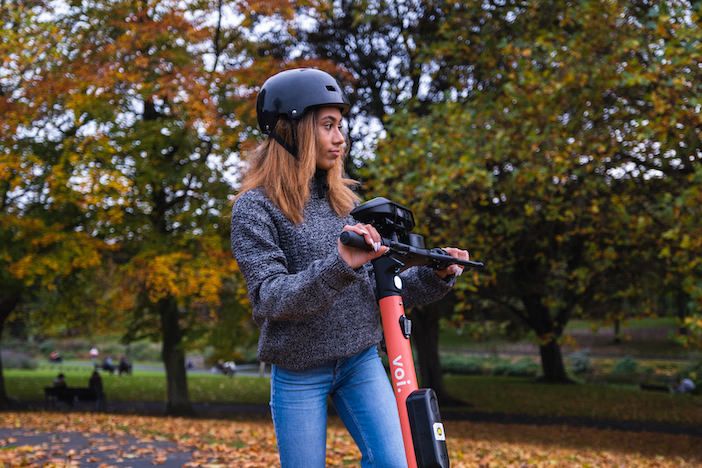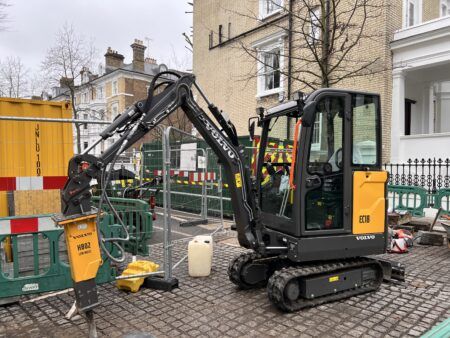Matthew Pencharz (above), Voi’s Head of Policy, UK, Ireland and the Netherlands is a shared e-scooter and e-bike devotee. But as a keen cyclist in his own time, he discusses the role played by micromobility in reducing reliance on polluting vehicles
I have been a cyclist for over 25 years, since commuting to my first job as a laboratory assistant at the Royal Free Hospital in London. This involved a daily climb up what has been recommended as one of the ‘classic UK’ ascents of Highgate West Hill. Cycling is a hugely important part of my life: it’s cheap, it’s healthy and gives me some blocks of time to think.
Over the decades, the number of cyclists has increased – there is safety in numbers and the more motorists become used to seeing cyclists the more they drive expecting to encounter one. The cycling infrastructure in many of our towns and cities has greatly improved, thanks to the work of the London Cycling Campaign, Sustrans and Cycling UK, and the more forward thinking local and regional authorities.

Meeting climate goals
In order to meet the UK’s net-zero target, the government’s own Transport Decarbonisation Plan has a target that half of all urban journeys are completed by cycling and walking by 2030. Of course most cycling journeys are relatively short, but so are car journeys with almost 60% being less than five miles and around a quarter less than two miles in 2019.
Voi would include in this target, in addition to walking to and cycling, micromobility in its broadest sense. While I am a cyclist, not everyone is, or wants to be, and in order to incentivise modal shift away from single occupancy car journeys we need to offer people safe, affordable and sustainable alternatives.
In the 18 months Voi has been operating in the UK, we have seen over 10 million rides completed by over half a million people across 17 towns and cities. Our riders tell us that 39% of the trips taken on a Voi would otherwise have been completed by a car, meaning that our services alone have removed almost four million individual car journeys.
Bristol has been named as Britain’s first ‘cycling city’ where, following a multi-million pound investment, almost 100,000km of cycleways have been mapped. With some 3.5 million Voi rides completed in the city, Bristol has most definitely become our first e-scooter city too. Similarly in Liverpool, the City Council has transformed its world famous riverfront with outstanding cycling infrastructure, which Voi riders can also use.

Challenging stereotypes
Transformational investment in cycling – and so also e-scooting – infrastructure will help to improve safety and incentivise more people to take to two wheels. The stereotype of a cyclist is of a white, male, relatively affluent professional, generally in Lycra. The stereotype of an e-scooter rider is young and male.
These stereotypes need to change. When one considers that a quarter of households have no access to a car, which rises to some 40-50% of households in our big cities, with these often being the more deprived and vulnerable, it is deeply unfair that our towns and cities remain so stubbornly car-centric, and so dissuading many from using more sustainable modes.
It is not just the government’s responsibility alone to drive this change. Micromobility operators such as Voi have a role too. Our service must be accessible and inclusive, which is why we have published a Micromobility for All report and commissioned research with Women in Transport to look further to strengthen the case for better, safer infrastructure, with results due in May 2022.

Changing road laws
At Voi, we fully support the recent changes to the Highway Code, which seeks to re-prioritise sustainable modes over cars. The updated cycle planning guidance – the snappily entitled Local Transport Note 1/20, released in 2020, calls for segregated cycle ways, which link together, don’t end as soon as there is a difficult junction to traverse and go directly where people want to. The UK has a lot of catching up to do and we’re not doing it fast enough, but it would be churlish to argue that no progress is being made.
Transforming our urban realm to meet climate goals and also to make our towns and cities fit for living, free from noise and congestion, faces practical, political and societal challenges. Some do not like change, and those who oppose these measures are often the wealthier, more influential and more connected.
A noisy minority should not be allowed to veto good policy and, with polling showing that introducing these measures are popular over the medium-term, braver civic leaders will be rewarded. The millions of cyclists, e-scooter riders and micromobility users of all types will be grateful, as will those who don’t use these modes but want to enjoy quieter, less polluted streets.





